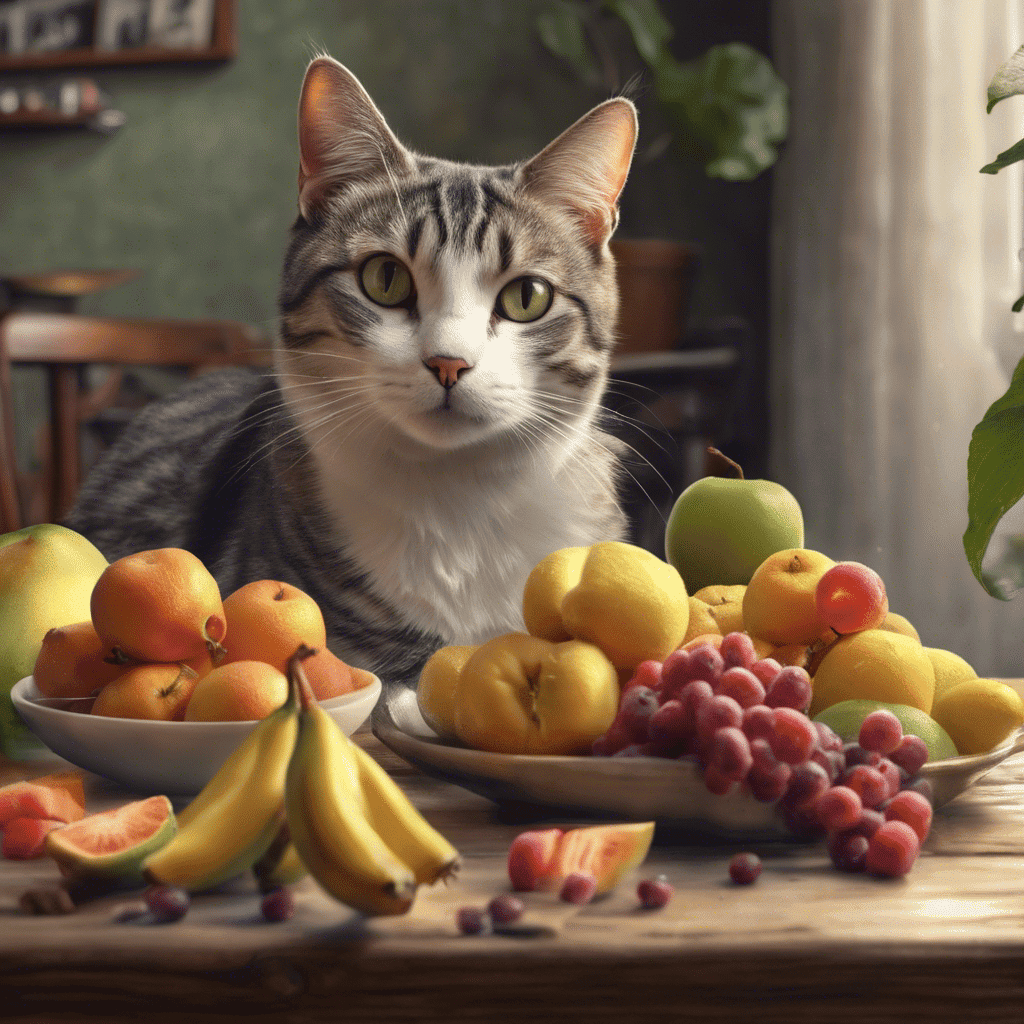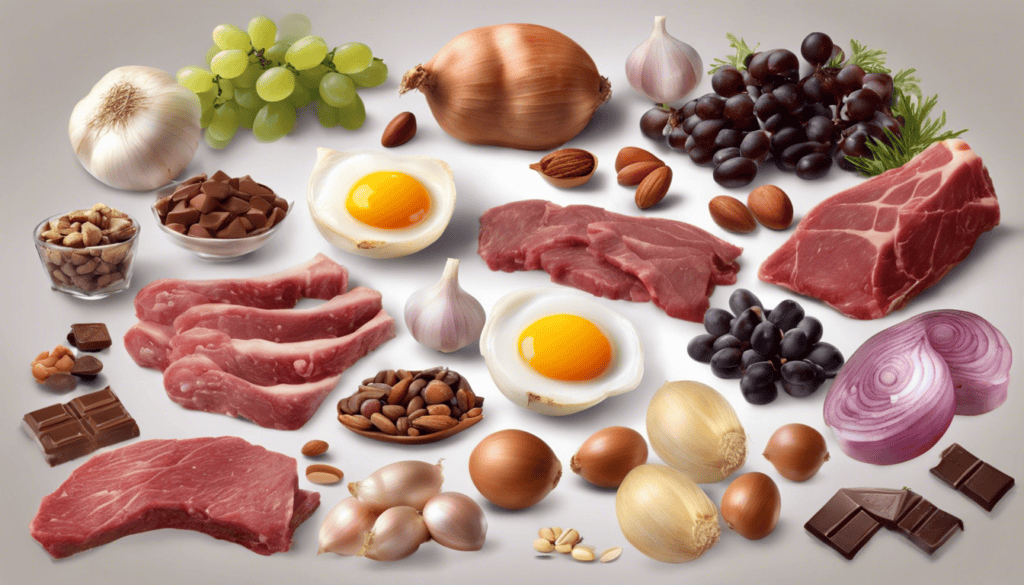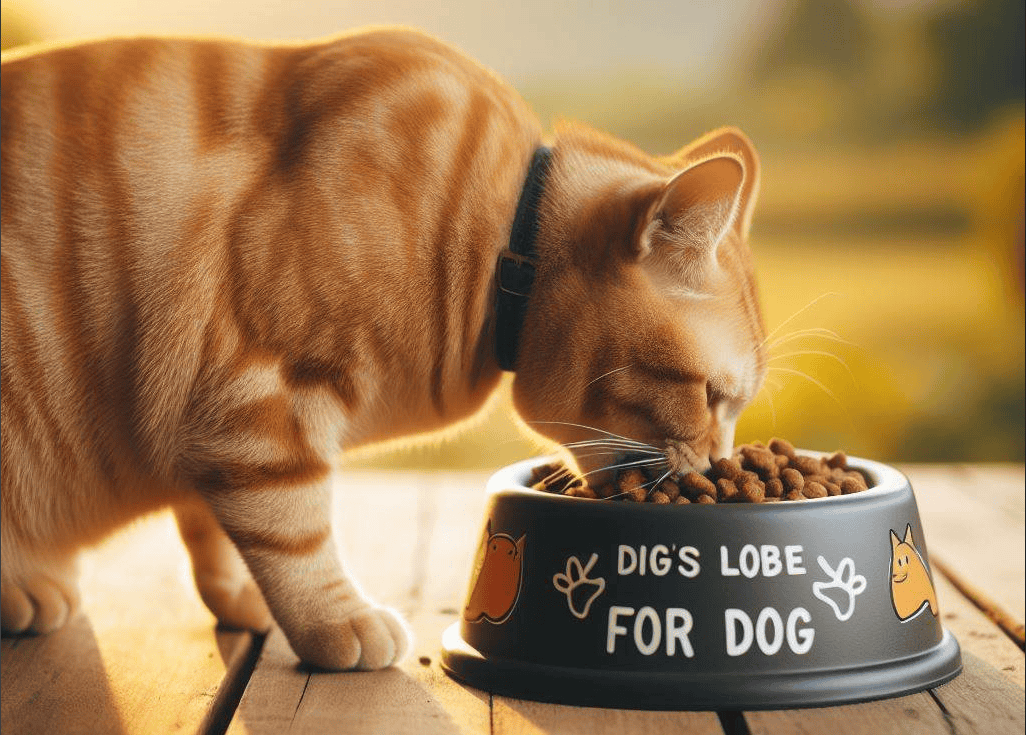
As pet owners, we always want to ensure our furry friends get the best nutrition possible. But have you ever wondered if cats can eat dog food? It’s a question that sparks curiosity and challenges common beliefs about the diets of our beloved feline companions.
Cat and dog diets have significant differences in nutrition and dietary needs. Veterinarians strongly advise against feeding cats dog food due to the potential risks it poses to their health. But is there any truth to the popular notion that cats can safely consume dog food?
Understanding Pet Food: Cats vs. Dogs
Cats and dogs are not just beloved pets but also animals with significantly different dietary requirements.
Effective pet care involves understanding these needs to ensure their health, longevity, and vitality.
In this section, we will compare the fundamental differences between the foods formulated for cats and those for dogs – explaining why it’s important to stick to the species-specific diet.
Nutritional Needs of Cats
Cats are unique among household pets because they are obligate carnivores. This means their bodies are finely tuned to extract nutrition mainly from animal-based sources. Cats require a range of specific nutrients that are inherently present in meat, such as taurine, arachidonic acid, and vitamin A. These are not merely beneficial for cats; they are necessary for survival.
One critical component is taurine, an amino acid found only in animal tissue. According to VCA Animal Hospital, Taurine which is exclusively found in animal-based protein is essential for cats’ normal vision, digestion, and heart muscle function.
Moreover, cats require a high protein intake which supports everything from their muscular framework to their health. Their bodies use protein as a primary energy source, unlike dogs, which can utilize carbohydrates as well.
Nutritional Profile of Dog Food
Dogs are comparatively omnivorous and can process a broader range of foods including meats, vegetables, and grains. This adaptability allows dog food to have a more varied nutritional profile. It often includes higher carbohydrate content for energy, along with a moderated amount of proteins and fats.
Given their ability to digest a variety of foods, fiber becomes an important component of a dog’s diet. It greatly aids in their digestive process and is present in higher quantities in dog food than in cat food. Fiber helps regulate bowel movements and contributes to gut health.
Comparative Nutrition Table
To encapsulate the differences, let’s revisit our comparative overview:
Nutrient |
Required by Cats |
Required by Dogs |
Importance |
|---|---|---|---|
| Protein | High (up to 50%) | Moderate (18-25%) | Essential for body repair, muscle growth, and energy in cats. Dogs require less. |
| Taurine | Essential | Not essential | Crucial for cats’ cardiac, visual, and reproductive health. Not needed by dogs. |
| Fiber | Low | Moderate to High | Supports digestive health majorly in dogs. Less critical for cats. |
| Carbohydrates | Very Low | Moderate to High | A primary energy source for dogs; less crucial for cats who use protein. |
Table 1: Detailed Comparison of Nutritional Needs in Cats and Dogs
Based on the differing nutritional charts and needs, it becomes clear why dog food is not a suitable or safe alternative for cats. For those interested in further information, the American Society for the Prevention of Cruelty to Animals® offers additional resources and guidelines on proper pet nutrition.
Through this deep-dive exploration of dietary necessities, we hope pet owners understand the risks associated with feeding cats dog food. Ensuring your pet has the diet suited to their species contributes to their day-to-day wellness and prevents long-term health complications.
Is Dog Food Safe for Cats? Short-Term and Long-Term Effects
While mixing up pet foods might seem harmless, it can have undesirable consequences, especially for cats due to their unique nutritional requirements.
This section explores the short-term and long-term effects of cats consuming dog food.
Short-Term Impact of Feeding Dog Food to Cats
In the short term, feeding dog food to a cat can lead to gastrointestinal upset. Cats might experience symptoms such as vomiting, diarrhea, and a lack of appetite. These reactions are often due to the higher fiber content and different protein composition in dog food, which is not ideal for a cat’s digestive system.
Here is a quick overview:
Symptom |
Cause |
Frequency |
|---|---|---|
| Vomiting | Irritation due to inappropriate food type | Common in first-time or infrequent exposures |
| Diarrhea | High fiber and foreign protein sources | Common if ingested in large quantities |
| Lack of Appetite | Disinterest due to taste or stomach upset | Less common but possible |
Long-Term Health Risks
Feeding dog food to cats regularly can lead to more severe health issues over time due to nutritional deficiencies. Dogs and cats have fundamentally different needs, and dog food lacks several critical nutrients that cats require to function healthily.
Key long-term concerns include:
- Nutritional Deficiency: Lack of essential amino acids like taurine in dog food can cause serious cardiac and vision issues in cats.
- Liver Problems: Without enough protein, a cat’s liver can become stressed or even start to fail.
- Heart Diseases: Taurine deficiency, specifically, is linked to dilated cardiomyopathy in cats, a serious heart condition.
Here’s a detailed look at potential chronic conditions cats could develop:
Condition |
Associated Deficiency |
Source |
|---|---|---|
| Dilated Cardiomyopathy | Taurine deficiency | National Library of Medicine |
| Liver Failure | Protein deficiency | PetMD |
| Poor Coat Quality | General malnutrition | WebMD |
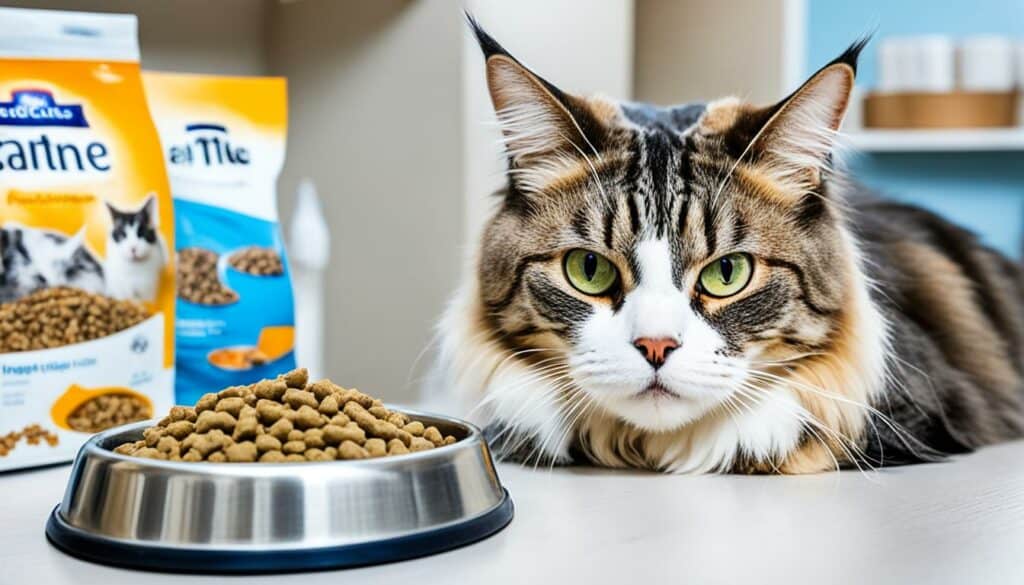
Understanding these relations between diet and health emphasizes the importance of maintaining a species-specific diet for pets. Pet owners should be informed of these risks, allowing them to make the safest dietary choices for their feline friends.
Prolonged feeding of dog food to cats is not just inappropriate, but it can be dangerous—this fact underscores the need for awareness and education about pet nutrition.
Through reputable sources and empathetic guidance, our goal is to safeguard the wellness of pets by clarifying the importance of providing species-appropriate diets, and ensuring a happy and healthy life for our beloved cats.
Expert Opinions on Cats Consuming Dog Food
Seeking professional advice is crucial when it comes to the health and nutrition of our pets. Experts in veterinary medicine have weighed in on the risks and considerations of feeding dog food to cats, providing a clear directive on this practice.
Veterinarian Advice on Cross-Species Feeding
Veterinarians universally agree that dog food does not meet the nutritional needs of cats and can lead to several health issues if fed regularly. Dogs and cats digest and metabolize food differently, and their food is formulated accordingly to support these specific needs.
Expert |
Position |
Key Insight |
|---|---|---|
| Dr. Ashley Gallagher | Veterinarian | Mixing pet foods without considering their specific formulations can negatively impact pets, causing issues like undesired weight gain or overexposure to certain nutrients. Consult a veterinarian before mixing pet foods. |
| Dr. Amanda Ardente | Veterinarian | For most healthy adult dogs, eating cat food occasionally is not necessarily harmful, as the higher protein and fat content can meet or exceed their nutrient requirements. However, for dogs with certain health conditions like kidney or liver disease, obesity, or pancreatitis, consuming cat food could exacerbate their issues due to the excess protein and fat. |
| Dr. Zara Boland | Clinic Vet | Cats are obligate carnivores with unique dietary needs, including requirements for specific nutrients like taurine and arachidonic acid that are not adequately provided in dog food. While cats can eat dog food occasionally without harm, a long-term diet of dog food can lead to detrimental health consequences for cats. |
These experts, who are veterinarians, provide insights into the potential risks and considerations involved when cats consume dog food. Their key points highlight the differences in nutritional requirements between cats and dogs, the importance of consulting veterinarians before mixing pet foods, and the potential health issues that can arise for both cats and dogs from consuming inappropriate diets.
Nutritional Adjustments and Considerations
If a cat has inadvertently consumed dog food, or in rare cases where short-term feeding is unavoidable, experts suggest immediate nutritional adjustments to mitigate potential health risks.
Here are the steps recommended by nutritionists:
- Immediate Dietary Correction: Replace dog food with cat-appropriate food as soon as possible.
- Supplementation: Consider supplements to quickly address any nutritional gaps, particularly with taurine.
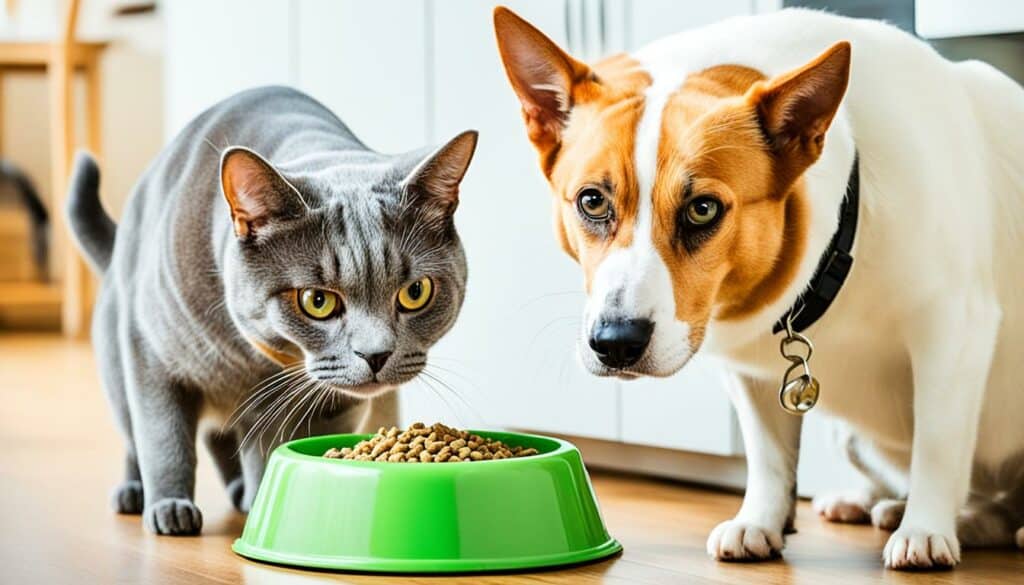
This section also reflects on the bigger picture of proper pet nutrition management:
Aspect |
Recommendation |
Benefit |
|---|---|---|
| Regular Diet Monitoring | Regularly assess and adjust the cat’s diet with a vet’s guidance | Ensures the cat’s nutritional requirements are consistently met |
| Emergency Preparedness | Keep a supply of the correct cat food to prevent cross-species feeding | Prevents accidental feeding errors |
Responsible Pet Feeding
Veterinary experts stress the importance of educating pet owners about the specific dietary needs of their pets. They advocate for clear labeling and more accessible information on pet food packaging.
By integrating insights from well-respected authorities in the field of veterinary medicine and pet nutrition, this section aims to equip readers with the knowledge they need to make the best choices for their feline friends’ dietary needs.
blog focuses on the proper alternatives to dog food and how to respond if a cat consumes dog food.
Alternatives and Safe Practices
Choosing the right food for your cat is crucial. Cats have specific dietary needs that must be met to maintain their health and well-being.
Recommended Cat Foods
When selecting food for your cat, it’s essential to choose products that are specifically formulated for cats and meet all their nutritional requirements. Here are some pointers on choosing the correct cat food:
- High Protein Content: Look for foods that list meat as the first ingredient.
- Taurine Enrichment: Ensure the food contains taurine, vital for heart health and vision.
- Age Appropriate: Select a formula appropriate for your cat’s life stage, e.g., kitten, adult, or senior.
Here’s a concise table with some recommended types of cat food:
Food Type |
Features |
Benefits |
|---|---|---|
| Wet Food | Higher moisture, various proteins | Supports hydration and provides a variety |
| Dry Food | Convenient, long-lasting, various nutrients | Helps clean teeth, is easy to store |
| Specialized | Formulas for specific health needs | Target-specific dietary requirements |
What to Do If Your Cat Eats Dog Food
Accidental ingestion of dog food can happen, especially in households with multiple pets. Here’s how to handle such situations:
- Immediate Action: Replace the dog food with appropriate cat food as quickly as possible to prevent further ingestion.
- Observe: Watch for any adverse reactions such as vomiting or diarrhea.
- Consult a Veterinarian: If you notice any health issues or if the cat continues to consume dog food, seek professional advice immediately.
For more detailed guidelines, pet owners can refer to WebMD Pets for a list of safe and suitable cat foods and tips on emergency responses to dietary mishaps.
Keeping Cats Away From Dog Food
Ensuring that your cat does not have access to dog food involves simple preventive measures:
- Separate Feeding Areas: Keep your pets’ feeding areas separate to avoid any mix-ups.
- Proper Storage: Store dog food away from the reach or sight of your cat to prevent curiosity-led feeding.
- Meal Supervision: Supervise mealtimes if your pets eat near ensure they do not eat each other’s food.
FAQs about Cats and Dog Food
Many cat owners wonder about the implications of feeding dog food to their cats, either out of curiosity or in emergencies. This FAQ section tackles the most frequent questions with straightforward, easy-to-understand answers.
Can Cats Survive on Dog Food Temporarily?
While cats might not immediately suffer from eating dog food once or twice, it’s not suitable for their long-term health. Dog food lacks essential nutrients that cats need, like taurine and arachidonic acid, which are critical for their heart health and overall well-being.
What Happens if a Cat Regularly Eats Dog Food?
Regular consumption of dog food can lead to severe health complications for cats, including heart disease, vision problems, and digestive issues. This is because dog food does not meet the higher protein and specific nutrient requirements of cats.
Is There Any Safe Amount of Dog Food for Cats?
No, veterinarians generally do not recommend feeding any amount of dog food to cats. It is always best to feed cat-specific food to meet their unique dietary needs.
How Can I Prevent My Cat from Eating Dog Food?
Keeping cat and dog feeding stations separate and ensuring each pet is fed only its food are effective strategies. Always store dog food out of the reach of your cat and supervise pets during meal times if they tend to eat each other’s food.
What Should I Do if My Cat Accidentally Eats Dog Food?
If it happens occasionally, monitor your cat for any adverse reactions and return to a normal diet with appropriate cat food. If your cat consumes dog food regularly or shows signs of illness, consult a veterinarian immediately.
For those seeking more in-depth information or facing specific issues, resources like the Pet Nutrition Alliance provide valuable guidance and expert advice on proper feeding practices for cats and dogs.
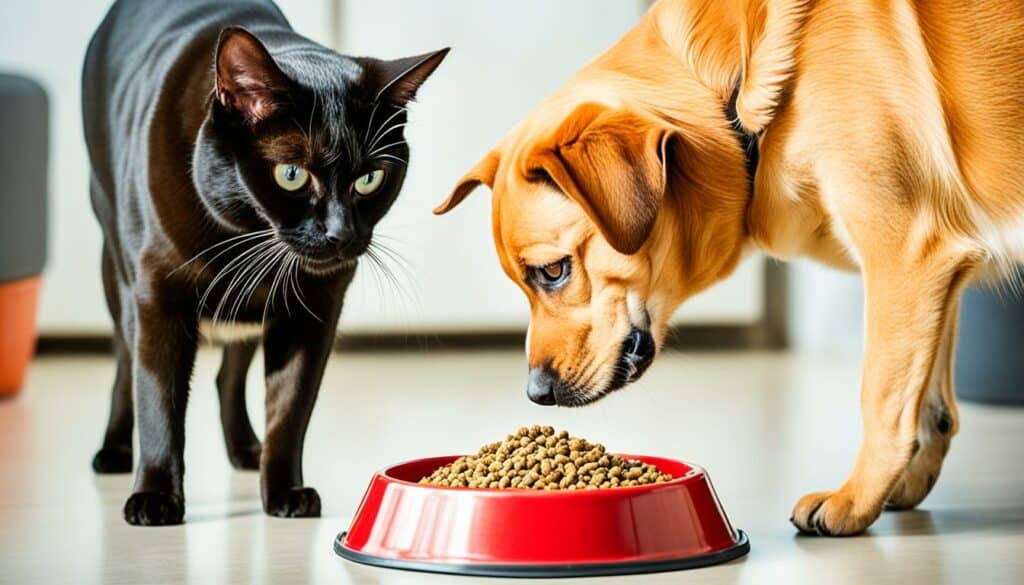
In this guide, we discussed whether cats can eat dog food and learned it’s not for long-term consumption. Cats have specific nutritional needs that dog food doesn’t meet, risking their health.
Always consult a veterinarian for any concerns about your cat’s diet or health, especially after accidental ingestion of dog food. Proper nutrition is crucial for your pet’s well-being.
Thanks for reading! We hope this guide helps you care better for your pets. Keep learning and prioritizing their health.

In her previous life, Lisa traveled extensively, both for work and leisure. After the pandemic struck, Lisa locked up her luggage and adopted a cat ever since.
Lisa is now an avid cat lover, she devotes most of her free time serving as butler to her adorable feline at home. When she is not with her cat, she can be seen using her phone sourcing for the latest cat supplies online.

